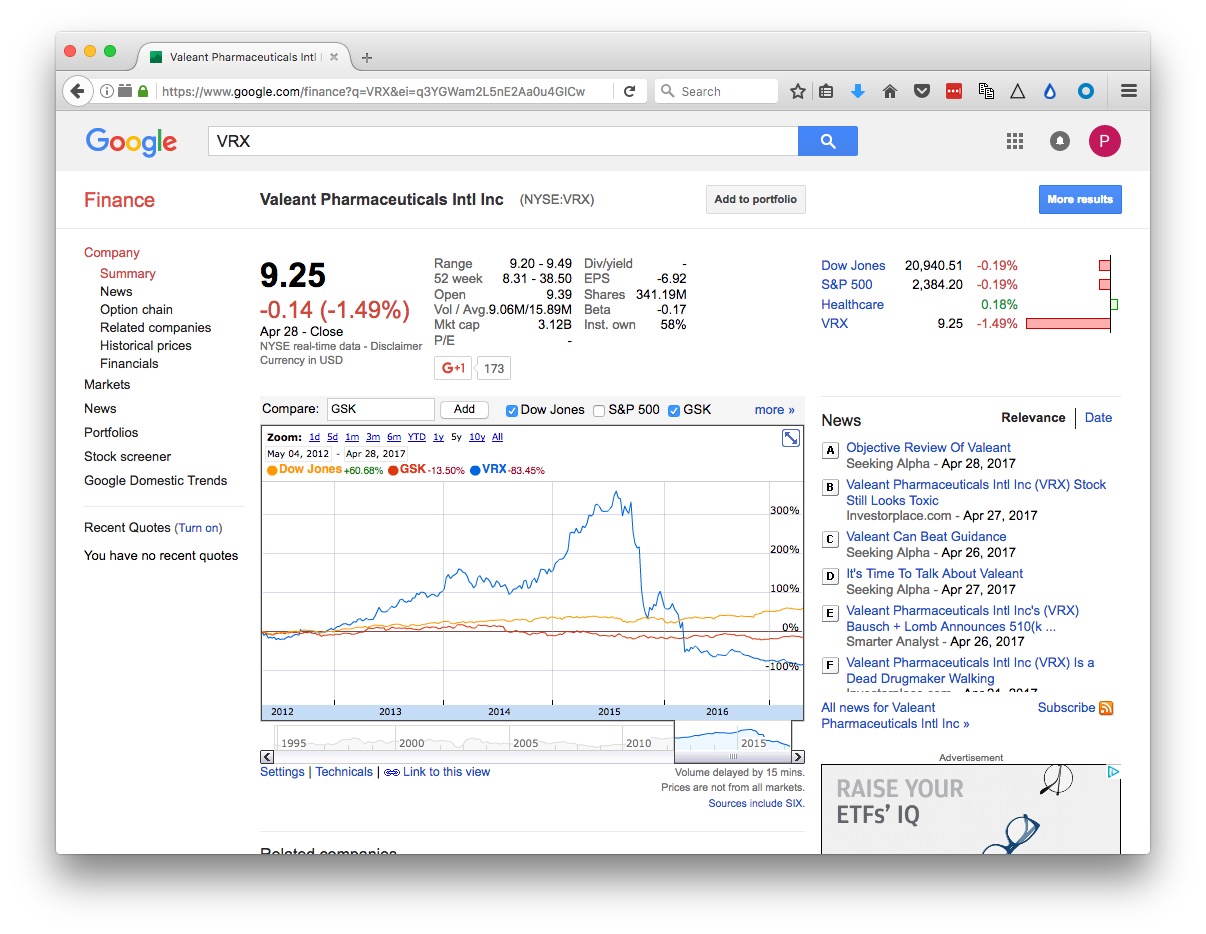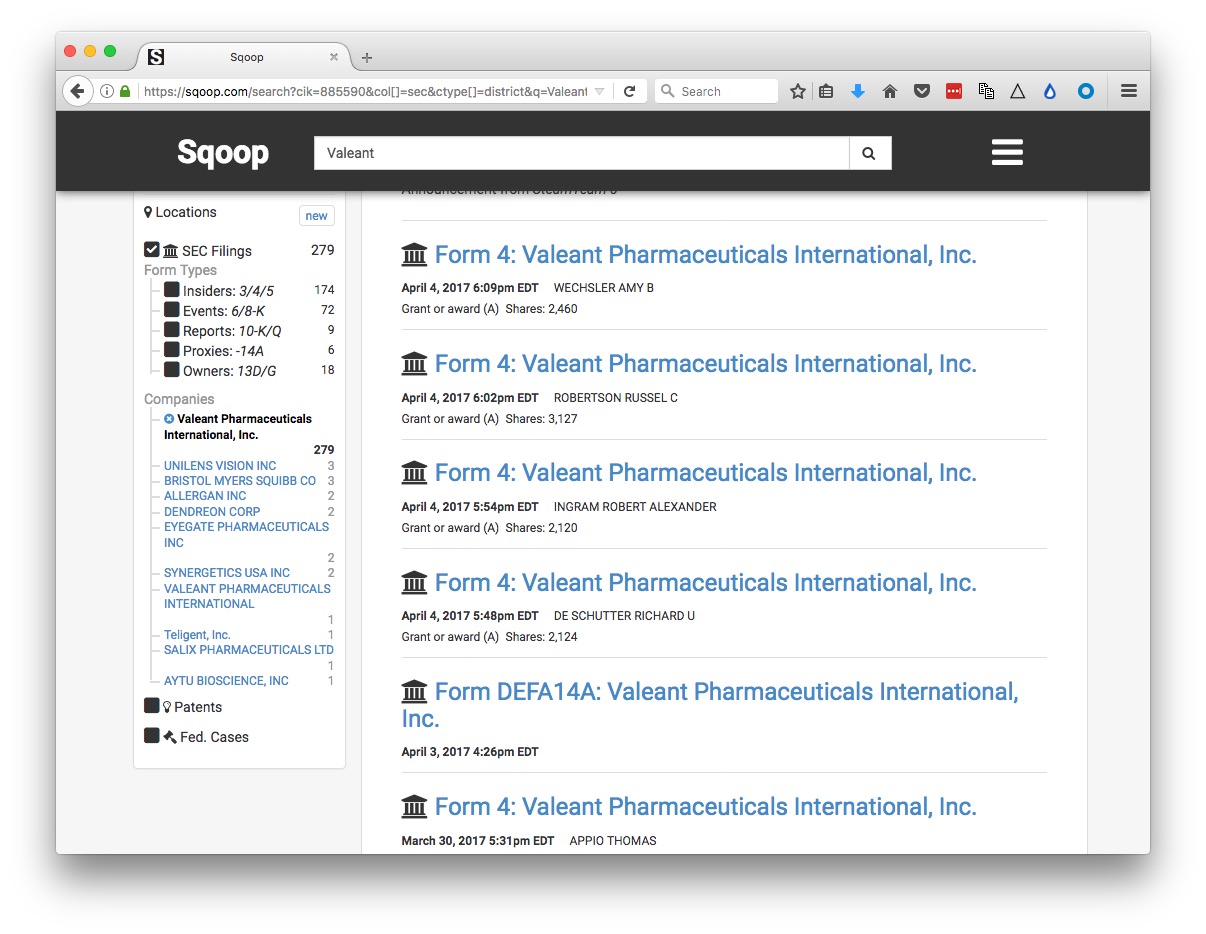Backgrounding companies
If a company is public, meaning its shares are traded on a stock exchange, then the value of its shares, and the volume of their trading, can provide useful information about its general health, and reveal significant events affecting the company. Google and Yahoo both operate finance sites at which you can view these metrics over time.
In class, we will use Google Finance to explore the history of trading of in the stock of companies including Valeant Pharmaceuticals, which became controversial in 2015 after being accused of price gouging.
At Google Finance, you can view the graphs of stock value and trading volume over various periods (up to ten years), and compare both to Related companies, listed below the graph, or standard indices such as the Dow Jones Industrial Average. Companies can be searched by their full names, or by their abbreviated stock market ticker — VRX in the case of Valeant:

Yahoo Finance also allows you to download data on the stock value history of companies by constructing urls of the following form:
Valeant:
http://real-chart.finance.yahoo.com/table.csv?s=VRX
Dow Jones Industrial Average:
http://real-chart.finance.yahoo.com/table.csv?s=^DJI
Search here for the tickers/symbols for companies and indices to use in constructing these urls.
Securities and Exchange Commission
Public companies are regulated by the Securities and Exchange Commission (SEC), which describes its role as to “protect investors, maintain fair, orderly, and efficient markets, and facilitate capital formation.” Traded companies are obliged to report certain information to the SEC, which you can view by searching for them at the SEC’s main company search page.
At the page for each company, you will find its filings to the SEC over time. Here is a guide to the codes for some of the most important documents:
10-K is the annual report, giving year-end financial statements, a history of the company, legal entanglements, insider conflicts of interest and a detailed management discussion of the company’s prospects. The section marked Risk Factors is especially informative. It is where a company describes all the things that might harm its prospects. This is where companies speak the truth that otherwise they would never utter — they do this here because it protects them from being accused by the SEC of misleading investors if they get into serious financial trouble. Here is the 10-K filed for 2009 by the diagnostics company Sequenom, in which this section makes for particularly interesting reading!
10-Q is the quarterly financial report.
DEF 14A is the proxy statement, which gives salaries, bonuses and stock holdings of top executives. It also gives biographies of some executives and directors, and lists the largest shareholders.
8-K announces important breaking news that may affect the stock price. Biomedical companies, for example, will report key results from clinical trials here.
Form 4 and Schedule 13D report stock transactions by insiders and key shareholders.
You can search for SEC enforcement actions here. Try searching for Sequenom and see what you find! (This brief story will provide some background to why Sequenom got into trouble.)
Here is the SEC’s full text search, which can be useful, for example, for finding references to individuals, and privately-held companies, in documents filed by publicly-traded companies. (Here is the FAQ page for that search form, explaining how touse it to best effect.
Sqoop
Sqoop is a relatively new site that aims to provide a one-stop-shop for information on companies. Sign up for a free account here.
You can search using the names of companies, individual corporate officers, or keywords, and it will return links to SEC filings, patents
and cases in federal courts. (You will still need a login for the PACER federal court search system to access federal court documents.)
Here are the results for a search on Valeant:

You can save a search to receive updates by email of new documents.
If you are a local reporter, Squoop also provides the option to narrow your SEC filing searches by geography. Click on the Locations button after running your search to activate this option.
Sqoop is currently made freely avilable to journalists, as it tries to expand its user base. It is a for-profit, however, so it is possible that charges will be introduced in future.
Privately-held companies
It is much harder to do background research on privately-held companies, which do not have to file reports to the SEC. Many of technology companies you are likely to be most interested in as science reporters will be privately held, backed by venture capital.
An example is Theranos, the blood-testing diagnostics company that became mired in a major scandal after a Pulitzer-winning reporter with the Wall Street Journal started to investigate its scientific claims and glowing media coverage.
So think about the agencies (state and federal) that have some oversight or regulatory role. For example, a company running animal experiments will have to file reports about its use of animals to the U.S. Department of Agriculture’s Animal and Plant Health Inspection Service, and will be inspected from time to time, see here.
Does the company, its staff, or facilities, need to be licensed? Doctors and many other professionals do, and their licensing information will usually be searchable online, and will including disciplinary actions. Many types of businesses, from car repair shops to nursing homes, will also have to be licensed, usually at the state level.
Does the company have a loan from the Small Business Adminstration? Search here. Does it have a Small Business Innovation Research grant? Search here.
Has the company received any other grants or contracts from the federal government? Search at USASpending.gov.
Does the company have problems with Occupational Safety and Health, either at the federal or state (here, for California) level? (Note, Cal/OSHA files its inspection and enforcement activity in the federal database.)
Companies’ own press releases can be useful, and are now usually archived online, either on a company’s own website, or through services like PR Newswire and MarketWired.
While somewhat dated, here is a useful guide to backgrounding privately-held companies with some more tips.
In the U.S., companies are registered with the authorities in the state they call home. You can search for businesses registered in California here. Find out more about available information here. You can order basic documents about companies’ registration using this form.
But be aware that the name a company trades under may not be its registered name. To find out the registered name, you may need to run a “fictitious business name” search at the county level. Here is the search site for Santa Cruz County, and here is useful a site from which you can navigate down to all sorts of public records at state and country levels, including fictitious business name searches.
OpenCorporates is an ambitious effort to build a database of information on companies throughout the world, public and private.
Lawsuits
Companies are frequently involved in lawsuits, so use court searches to identify these.
Finding current and former employees
Any time you are investigating an organization, whether a company or a nonprofit, former employees can be an invaluable resource. (Of course, you need to be wary of embittered ex-employees settling scores.) In recent years, LinkedIn has emerged as the best way of finding them.
If you are a professional journalist (so you may have to wait until you’re out in the world of employment!) you can ask to join the LinkedIn for Journalists group. You should then get an invitation to attend a webinar, and once you’ve done that you’ll be granted a free premium account, which allows you to use the site’s advanced search functions and send InMail messages to people you want to contact.